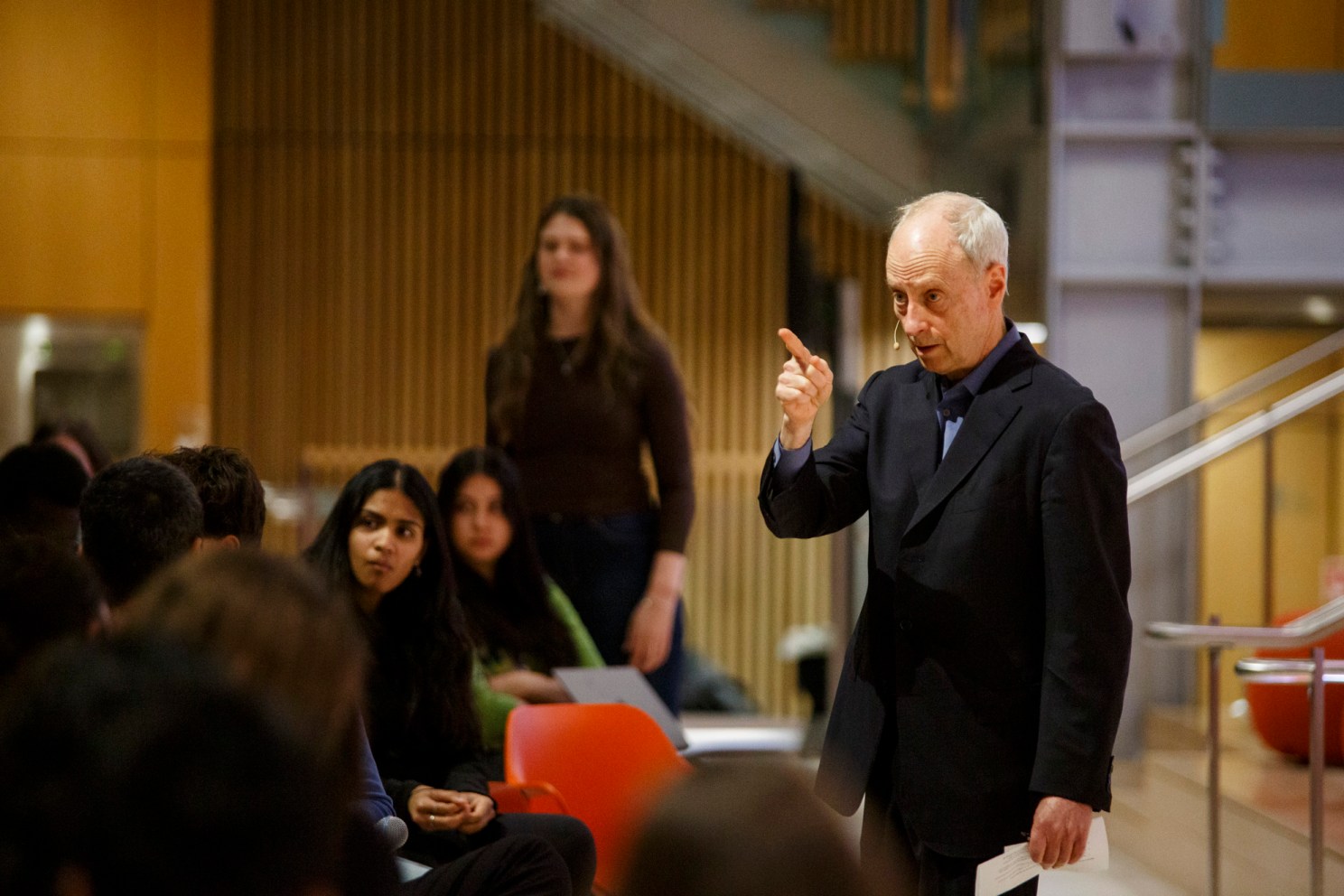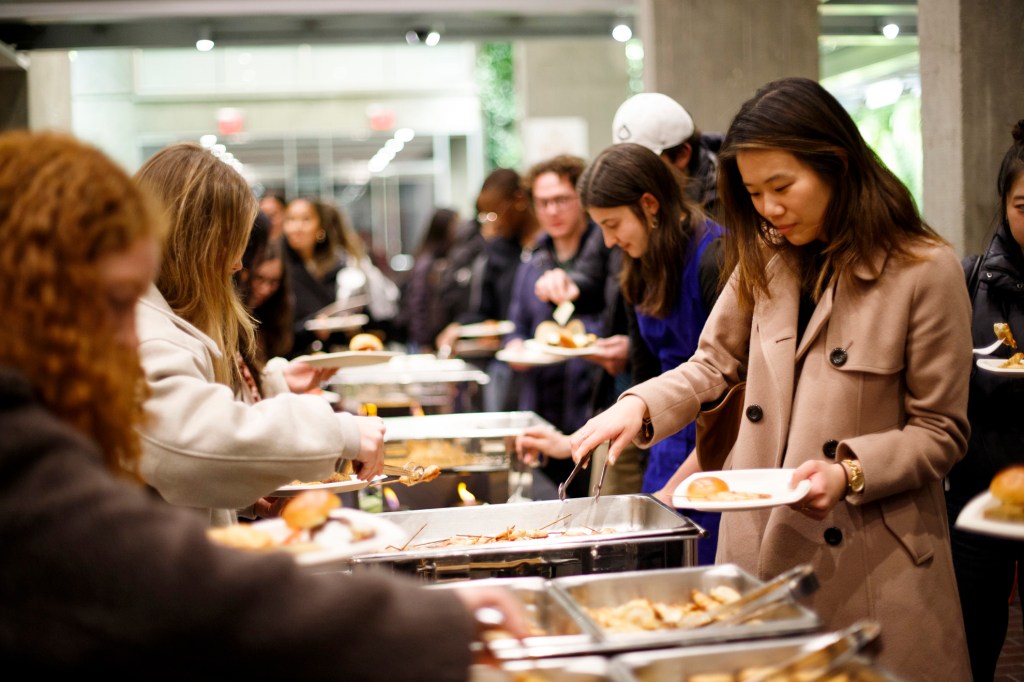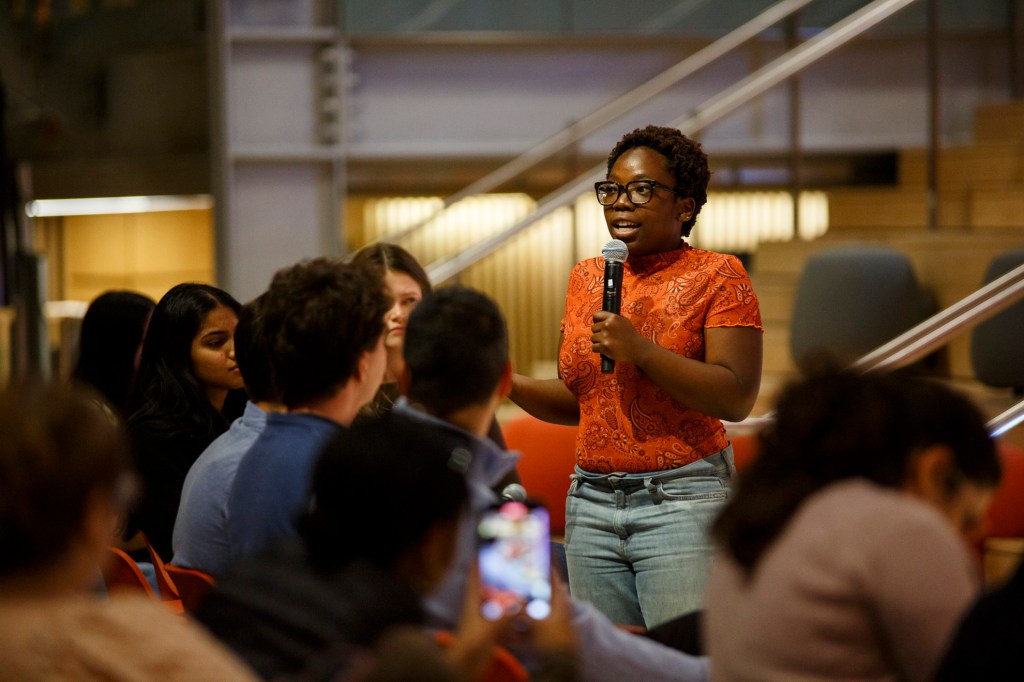The food was good. The conversation was better.

Professor Michael Sandel (right) led a conversation for the “Food For Thought” event.
Photos by Grace DuVal
‘Our Harvard’ brings students together to tackle tough issues
First they met for coffee. This month they came together for a full meal.
Spurred by the Gaza conflict, Nim Ravid ’25, an economics concentrator from Israel, wanted to find new ways to connect students across the College. Last summer, he co-founded “Our Harvard” with five of his peers, and one of their first efforts was pairing students for coffee chats meant to encourage conversations across differences.
On April 1 at Smith Campus Center, the group hosted a larger gathering: “Food For Thought: Our Harvard College,” an evening of conversation during which students offered their perspectives on a range of issues.

Ravid was heartened by the results.
“It was the most vulnerable and honest I’ve ever heard Harvard students communicating with each other, which I think reflects our efforts to bring students from across campus together to this event and create an environment where students assume best intentions and say what they actually think,” he said.
The conversation, which was followed by a meal provided by Harvard University Dining Services, was moderated by Michael Sandel, Anne T. and Robert M. Bass Professor of Government.
“There’s a risk with conversations like this, that everyone will think it’s much safer to just celebrate diversity, eat some food, and go home, but that would miss the learning and the struggling and the wrestling with the questions out of which friendships and genuine dialogue can be forged,” Sandel told the crowd.
One by one, members of Our Harvard and those in the audience spoke about feeling ostracized for their identity, national origin, or beliefs, and finding it difficult to establish friendships across differences. Frederico Araujo ’25, an Our Harvard founder from Portugal, discussed his struggles connecting with students from Brazil.
“Sometimes when I came to Annenberg and I initiated a conversation that I hoped would be about our shared language, our shared food, our shared music, and our many shared traditions between Brazilian and Portuguese culture, I would actually get the cold shoulder,” he said. “I don’t need to give a history lesson about the historical background between Portugal and Brazil, but I wasn’t aware that those historical ties would be sufficient for someone to ignore my friendship.”
In response, Sandel said, “Sometimes seeming similarities can be startling for their distance.”
The conversation covered the Israel-Palestine conflict, with Ravid and others expressing their fears about sharing personal experiences. Several participants with no direct connections to the war said they have found themselves uncomfortably in the middle of friends with different views.
Angie Gabeau ’25, another founding member of Our Harvard and a sociology concentrator, acknowledged being apprehensive when the conversation turned to the Middle East, but said that it was beneficial in the end.
“I’m actually glad that it was brought up,” she said. “If you are talking about the hottest topic on the market right now and are still able to make yourself vulnerable to discussing with people who might not agree with you, then other cases will be a lot less daunting.”

Gabeau, a Boston native, told the audience that she arrived at Harvard hoping to connect with other Black students after coming from a predominantly white high school. The Winthrop House resident joined the Black Students Association, the Kuumba Singers, and Omo Naija x The Wahala Boys, an African dance troupe.
“I was so happy to be able to find a community here,” she said. While emphasizing the importance of these groups, Gabeau also said that she believes it’s important to build relationships across differences. “This conversation wasn’t to shadow the importance of affinity organizations but seeing how we can both share our cultures, ideas, values, and morals with each other, while being able to feel safe here at Harvard,” she said after the event.
Harvard College Dean of Students Tom Dunne found it meaningful “that the core group of students who are organizing this are seniors in their last weeks on campus.”
Ravid expressed his hope that Food for Thought will help spark similar movements at Harvard. “I also hope this event will encourage others to not treat other students differently based on their identity, but rather for who they are,” he said. “I hope students will really take time to get to know each other before they judge.”
Gabeau noted that Our Harvard has set goals that do not ask too much of students.
“I don’t want this to come off as, ‘We can all be friends and everything’s going to be perfect,’ because that’s not really what we’re trying to do,” she said. “There’ll be people who have disagreements that won’t foster friendship. I wouldn’t want people walking around campus pretending to be friends.”
She continued: “It’s not supposed to be creating a perfect utopian universe but rather pushing people to go the extra mile in terms of seizing all the opportunity in the different pockets of joy and growth that there is on campus.”




